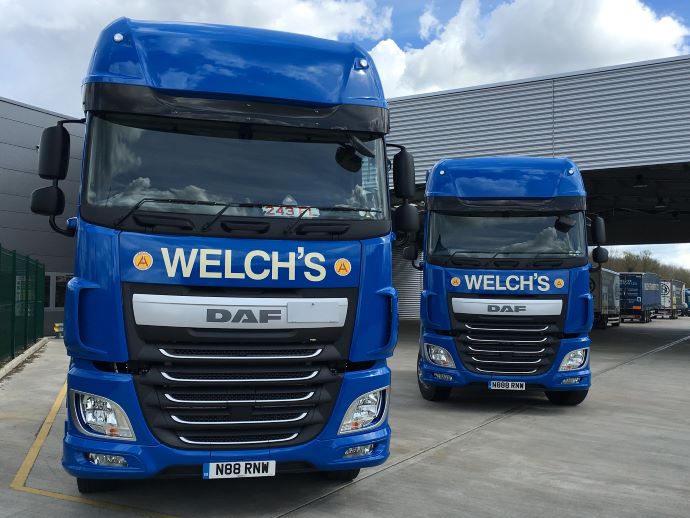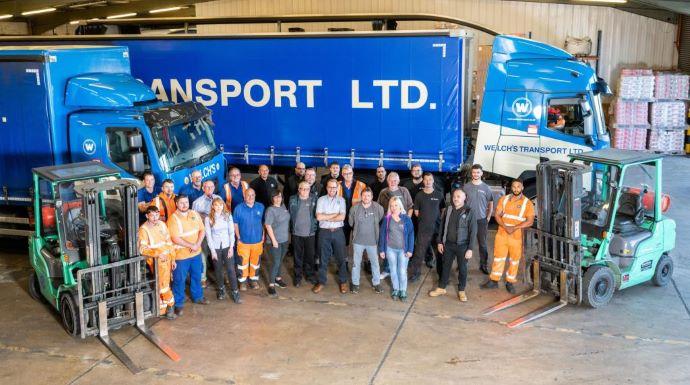Welch’s Transport is an independent, family-owned and run provider of general haulage and logistics services. A part of the Welch Group, the company dates all the way back to 1934 and has a long-standing history of supporting customers across Cambridge and East Anglia with a range of distribution services. While the firm certainly comes with extensive capabilities, this is then paired with a more local and personable service than many of the firm’s national competitors. This has understandably proven a key differentiator for the company and has allowed for it to develop a strong customer base with large volumes of repeat work and continued commercial growth.
Welch Group has a number of different divisions and brands offering services to slightly different segments of the market. This includes: Welch’s Transport, TBM Solutions UK, Welch’s Specialist Movements, Welch’s Crane Hire, WTL Truck & Van Centre, and JPS Installs. Through these different arms, the group is able to offer everything from traditional haulage through to: warehousing, 3PL ecommerce fulfilment, specialist movements, crane hire, office moves and installations, scientific and laboratory moves, machinery and plant room moves, contract distribution, and vehicle servicing through its Renault franchised truck and van centre. For the purpose of this piece, we’ll be focusing on the operations of Welch’s Transport.
A key factor behind the success of Welch’s Transport is the more personable approach to customer service, client interaction, and cooperation within the supply chain. As a smaller player within the market, the firm certainly has well established relationships with key customers, with members of the Welch family being very accessible to catalyse decision making processes. Furthermore, the company maintains strong connections with other contractors in the field who work with the company on a partnership basis to expand its overall capabilities without questioning service standards. These two factors ultimately come together to provide a strong foundation upon which Welch’s Transport can offer tailored services at significant scale, reliably.
Sustainability & Green Initiatives
Respecting the almost unavoidable impact that logistics has on the environment, Welch’s Transport makes a conscious effort to manage its carbon footprint and work in the most responsible fashion possible. That said, the company is certainly more innovative than we commonly see in the marketplace and is actively pushing the boundaries of what is possible, or at least what is considered to be. This has led Welch’s Transport into being one of earliest adopters (certainly among SME operators) of electrification in the core haulage fleet; this being evidenced in the purchase of a 19-ton electric rigid that is being used to demonstrate the viability of electrification in the transportation of goods within a controlled geographic area. Is it a risky move? Sure, but it’s also a critical step in catalysing innovation within the space and giving the wider industry the confidence needed to start scaling up their own EV infrastructure.
Chris Welch, Commercial & Operations Director commented: “It’s the right thing to do and we are eventually going to have to do it anyway. In terms of cars, we already have a few electric company cars and if you remember, a couple of people always complained about the range and that those would never work either. But if you look around Cambridge now, every 10th car I see is an electric. I think the same will be said about rigids, HGVs and LGVs one day. There are certainly applications for them and we run our own truck centres (we repair our own trucks and provide that as a service too) so part of this is that, from a mechanical and service view, we’ll also be one of the first dealers to be able to work on a operational EV rigid.”
Further to these investments, Welch’s Transport has also been injecting funds into modernising its fleet from the more traditional perspective, ensuring that the entire fleet is EURO 6 compliant. In doing so, the company is able to benefit from a lot of the new and innovative technology that is now being installed into modern trucks to improve efficiencies. This comes alongside continued investment into the firm’s tracking and telematics systems, as well as how these ultimately support driver training and associated efficiencies. Ultimately, it’s all about maintaining an expert network of drivers that have the tools they need to operate responsibly and deliver a quality service.

Providing further information on some of the key areas of investment, Chris Welch furthered: “There’s a few things. First off, technology has increased and so we have tracking and routing systems that will produce the most efficient route to X amount of customers in a day. What that does is pool all of our customers together and produces the most cost-effective and environmentally friendly routes to get around all of our customers – whether they need that delivered tomorrow, in two days, or by the end of the week. That allows us to plan for efficiently and the best way to be environmentally friendly is ultimately to make sure you’re not driving around the UK in vehicles that are half empty and things like that.”
But it’s not just about the gathering of data for internal use, but also how that data can support relationships with clients. While Welch’s Transport is certainly ploughing on with its own sustainability journey, the company is well aware that this is an area of focus for all manner of business – including client businesses. With this in mind, the company now more actively reports on CO2 emissions which can be directly attributed to a particular workload so as best to inform its clients on the environmental impact within its supply chain. It’s these small touches that have really allowed for the company to integrate into client businesses and support their wider ambitions.
Going forward, Welch’s Transport is calling on organisations across the sector, its current customers and local communities to scale up levels of partnership and collaboration for the purpose of electrification.



